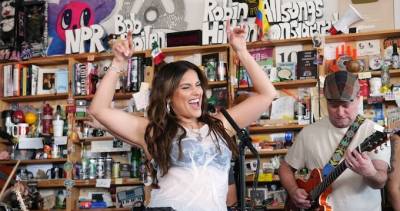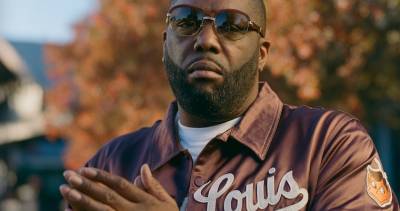Women in theatre go beyond fighting harassment and seek larger industry-wide changes
With sexual-harrassment allegations spreading from Hollywood to the Toronto stage scene, women in theatre here are working toward a larger culture shift in their industry.
“There’s sexual harassment, which is pretty blatant and in your face, but I really firmly believe this is about power imbalance,” explains the Cultch’s Heather Redfern. “It has been pointed out over and over again that men hold the majority of powerful positions in Canadian theatre.
“It’s more subtle and difficult to talk about the fact that women are paid less for some work, have fewer positions of power, their jobs are more menial tasks in the theatre. So I think all these things are wrapped up together. And I think sexual harassment is one of the consequences.”
Redfern points to the Cultch’s second annual Femme January program—which opened a series of three shows this week with Hot Brown Honey—as one example of what companies can do. (Other shows on the program are Reassembled, Slightly Askew, Shannon Yee's lyrical memoir of recovering from a brain injury, and I'm Not Here, a Doreann Coady's ode to her late brother; both are copresentations with the PuSh International Performing Arts Festival.) “This is our way to say, ‘Come on, guys: you’ve got to pay attention to this, you have to do it deliberately. You have to commit to doing 50 percent of work [in your season] where the main thrust is from a female creation.’ ”
Canadian Actors’ Equity Association executive director Arden R. Ryshpan agrees that solving the kind of sexual-harassment issues that have been hitting headlines ties into broader issues. “Improving the attitudes and engagement and portrayal of women has an impact on how women are treated in the workplace,” she tells the Straight over the phone from her Toronto headquarters.
At the same time, she stresses her field is not an isolated case: “The spotlight is on the entertainment industry now.…It’s not because things are worse in our sector than in any office building; it’s because when somebody does something in our industry it makes the front page of the newspaper.”
Equity started trying to improve women’s place in theatre, film, and TV long before four female actors filed a sexual-harassment lawsuit against Toronto’s Soulpepper Theatre Company artistic director Albert Schultz.
It launched the far-reaching Equity in Theatre program in 2014. Run out of the Playwrights Guild of Canada, it has aimed at addressing the underrepresentation of women in theatre. The multipronged national approach has spanned research studies, a symposium, live events, and a website. “The thing about trying to improve the lot of women in theatre or film and TV is that everybody in the sector has to work together,” Ryshpan explains. “So it’s fine, for example, if we say, ‘More women should be hired,’ but if playwrights aren’t writing more plays, then it doesn’t matter what we say about hiring more women.”
Canadian Actors’ Equity also kicked off the Not in Our Space! program last year. Spearheaded with the Professional Association of Canadian Theatres, it’s a zero-tolerance anti-harassment and -bullying policy that includes set protocols and support materials. Practices include identifying workplace advisors and a “first day talk” at the beginning of a show so that everyone will know who to speak to if incidents occur. Having gone industry-wide, the initiative’s next step is to be adopted at theatre schools, Ryshpan says.
Last week, Studio 58 at Vancouver’s Langara College became the first theatre school in the country to do just that. Explains its artistic director Kathryn Shaw: “I thought, ‘Yes, this is something we should be doing to help our students to be more conscious about the power they have.’ If they have something they need to speak up against, they need to speak up. It’s just to have more agency and control in their own lives.”
But while giving her students more tools to take with them into the profession, she agrees there are wider changes needed. “It’s part of a bigger issue: I keep hoping that women will write more roles for women. And there are not enough women that are being heard as playwrights or filmmakers,” she says. “And there are so few roles for women that competition is fierce.” Perhaps, she suggests, that has made them less likely to speak out against harassment, in the fear they might lose such a rare opportunity.
Ryshpan says there’s much more work to be done to get women into higher positions at organizations as well. Here in Vancouver, people like Redfern and Shaw have been trailblazers, with Bard on the Beach’s executive director Claire Sakaki and Ashlie Corcoran preparing to take the helm at the biggest theatre in Western Canada, the Arts Club.
“There are a number of exceptionally talented women out there, thankfully, moving into some of those key power positions. But we need to see some change in leadership on boards too: that’s the key to supporting the vision of the female artistic director,” says Ryshpan.
“Boards of directors need to get involved, not just in their makeup but in terms of their awareness,” concurs Redfern in her separate interview.
The women the Straight talked to hope that out of all the negative headlines over sexual harassment they can gain some positive momentum to bring about change.
“In a weird way we have Harvey Weinstein to thank for all this,” observes Ryshpan. “If he wasn’t such a dreadful human being we wouldn’t be having these conversations. It’s going to be harder to ignore women now when they talk about having more positions of power."















Comments